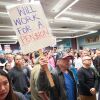Boeing machinists rejected the latest offer, and a bruising six-week strike continued
SEATTLE — Boeing machinists voted Wednesday to reject the company's latest contract offer, extending a bruising strike that has already lasted more than 40 days.

The deal – rejected by 64% of union members – would mean a significant wage increase for the 33,000 people on strike. Instead, those workers dealt another blow to Boeing, which reported a huge quarterly loss on Wednesday.
“When a company mistreats its workers for years there are consequences,” International Association of Machinists and Aerospace Workers District 751 President John Holden said in a statement announcing the vote.
“Boeing employees say they are fully and firmly committed to winning back more than what the company has taken from them for more than a decade,” Holden said.
The vote came on the same day that Boeing posted a staggering $6 billion loss for the third quarter of the year, one of the worst quarters in company history. These disappointing results were partly the result of work stoppages, which halted production at Boeing's factories in the Pacific Northwest.
But Boeing's problems run deeper than that. Even before the strike, the company was dealing with quality control and production problems in its commercial aviation operations. The company announced a $2 billion loss in its defense and aerospace business.

“We're clearly at an inflection point,” Boeing CEO Kelly Ortberg said in a conference call with analysts. “We need to reset our priorities and build a leaner, more focused organization.”
Ortberg has kept a low profile since taking over as CEO two months ago. That changed Wednesday, as Ortberg expressed his thoughts in a conference call and television interview. He talked about rebuilding Boeing's culture, putting managers closer to the engineering lab and the factory floor.
“The first thing we need to do is stabilize the business. And obviously, going through the IAM strike is the first big step in doing that,” Ortberg told CNBC. “It's more important in our long-term perspective. Getting back to aircraft manufacturing, delivering good aircraft.”

Union members rejected the company's first contract offer more than five weeks ago.
Boeing then offered a second contract, which it presented as its “best and final offer”. But the company angered union members by releasing the offer directly to the media instead of negotiating in person. The union rejected that proposal without a vote.

The union credited acting U.S. Labor Secretary Julie Sue with helping to restart stalled negotiations, which led to union members finally voting on Wednesday.
That deal included a 35% wage increase—a significant increase from Boeing's initial offer of 25%, though still short of the 40% increase the union initially sought. The company also pledged to increase its contribution to the employee 401k retirement fund.
There was one key union demand where Boeing refused to budge: the pension plan. Union members have made it very clear that they want to reinstate the defined benefit pension plan that was lost a decade ago.
The last time Boeing machinists went on strike in 2008, the work stoppage lasted nearly eight weeks, costing the company an estimated $2 billion. This time the economic loss may be greater.
KUOW's Casey Martin contributed reporting from Seattle, and Joel Rose reported from Washington, D.C.
